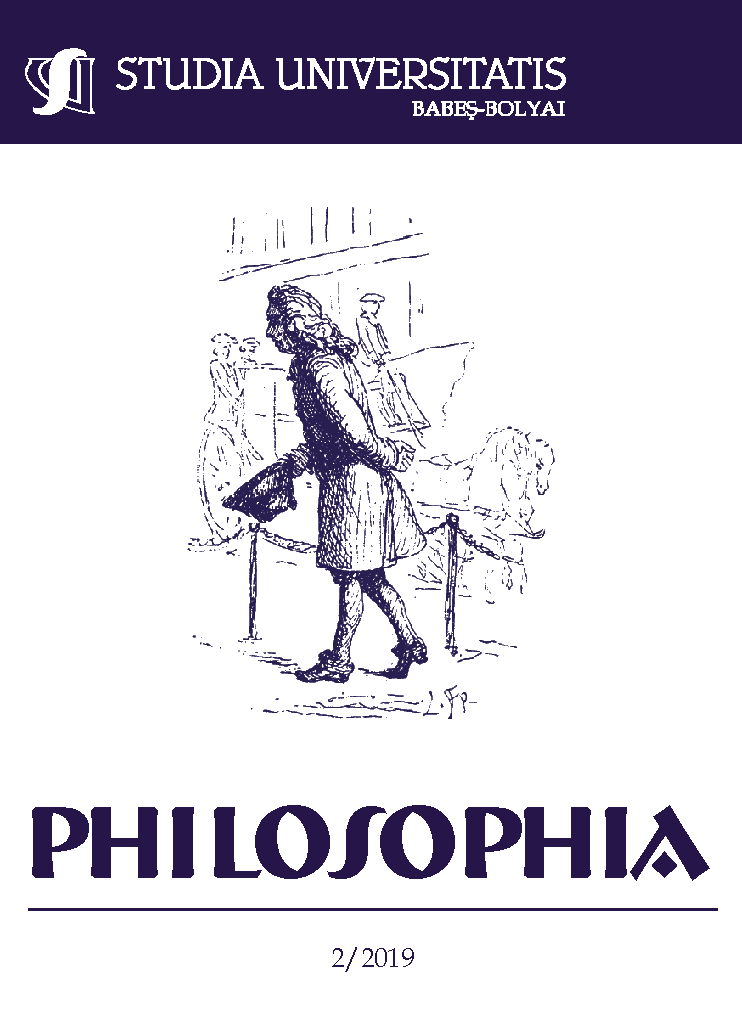REFERENCE, INTUITION, AND INTUITION ABOUT REFERENCE – NOTES ON THE EXPERIMENTAL PHILOSOPHY OF LANGUAGE DEBATE
DOI:
https://doi.org/10.24193/subbphil.2019.2.07Keywords:
philosophy of language, experimental philosophy, reference, philosophical expertiseAbstract
The introduction of experimental techniques as a tool of philosophical investigation has created quite a stir in analytic philosophy in the last two decades. Experimental results have shed a new light on traditional debates in various fields and have led to a reappraisal of the use and merits of various methods and types of arguments in philosophy. This paper provides an overview of the central debate regarding Machery et al.’s results and conclusions about the interplay between theory and various methods that are supposed to provide evidence for (a certain) theory. The debate is connected with the initial setting of the question of reference and, more generally, with the main staples of the philosophy of language. A large part of the paper is devoted to a discussion of the most important arguments and perspectives that have been developed or reformulated as a result of the debate on experimental philosophy. The final aim of the discussion is to provide a basic description of the contemporary landscape of philosophy of language and related epistemology, to inform future research designs and developments.
References
Andow, J. 2014. Intuitions, Disagreement and Referential Pluralism. Review of Philosophy and Psychology 5: 223-239.
Chomsky, N. 1995. Language and Nature. Mind 104: 1-61.
Deutsch, M. 2009. Experimental Philosophy and the Theory of Reference. Mind & Language 24(4): 445-466.
Devitt, M. 2011. Experimental Semantics. Philosophy and Phenomenological Research 82(2): 418-435.
Devitt, M. 2012. Whither Experimental Semantics?. Theoria 73: 5-36.
Devitt, M. & Sterelny, K. 1999. Language and Reality. An Introduction to the Philosophy of Language. Second edition. Oxford: Blackwell.
Flanagan, B. 2014. Rereading the Kripkean Intuition on Reference. Metaphilosophy 45(1): 87-95.
Føllesdal, D. 1998. Essentialism and Reference. Expanded edition. In: L. E. Hahn & P. A. Schilpp, eds. The Philosophy of W. V. Quine. Chicago and La Salle, IL: Open Court, 97-113.
Genone, J. 2012. Theories of Reference and Experimental Philosophy. Philosophy Compass 7(2): 152-163.
Genone, J. & Lombrozo, T. 2012. Concept possession, experimental semantics, and hybrid theories of reference. Philosophical Psychology 25(5): 717-742.
Gutting, G. 2009. What Philosophers Know. Case Studies in Recent Analytic Philosophy. Cambridge: Cambridge University Press.
Hintikka, J. & Sandu, G. 1995. The Fallacies of the New Theory of Reference. Synthese 104(2): 245-283.
Ichikawa, J., Maitra, I. & Weatherson, B. 2012. In Defense of a Kripkean Dogma. Philosophy and Phenomenological Research 85(1): 56-68.
Jackman, H. 2009. Semantic intuitions, conceptual analysis, and cross-cultural variation. Philosophical Studies 146: 159-177.
Jackson, F. 2010. Language, Names, and Information. Malden, MA: Wiley-Blackwell.
Kripke, S. A. 1980. Naming and Necessity. Cambridge, MA: Harvard University Press.
Ludwig, K. 2007. The Epistemology of Thought Experiments: First Person versus Third Person Approaches. Midwest Studies in Philosophy 31: 128-159.
Machery, E. 2011. Variation in Intuitions about Reference and Ontological Disagreements. In: S. D. Hales, ed. A Companion to Relativism. Oxford: Wiley-Blackwell, 118-136.
Machery, E. 2012a. Expertise and Intuitions about Reference. Theoria 73: 37-54.
Machery, E. 2012b. Semantic Epistemology. A Brief Response to Devitt. Theoria 74: 223-227.
Machery, E., Mallon, R., Nichols, S. & Stich, S. P. 2004. Semantics, Cross-Cultural Style. Cognition 92: B1-B12.
Machery, E., Mallon, R., Nichols, S. & Stich, S. P. 2013. If Folk Intuitions Vary, Then What?. Philosophy and Phenomenological Research. 86(3): 618-635.
Machery, E., Olivola, C. & De Blanc, M. 2009. Linguistic and Metalinguistic Intuitions in the Philosophy of Language. Analysis 69: 689-694.
Machery, E. & Stich, S. 2012. The Role of Experiments in the Philosophy of Language. In: G. Russell & F. D. Graff, eds. The Routledge Companion to the Philosophy of Language. New York: Routledge, 495-512.
Mallon, R., Machery, E., Nichols, S. & Stich, S. 2009. Against Arguments from Reference. Philosophy and Phenomenological Research 79(2): 332-356.
Marti, G. 2009. Against Semantic Multi-culturalism. Analysis 69: 42-48.
Nisbett, R. E. 2003. The Geography of Thought. How Asians and Westerners Think Differently and Why. London: Nicholas Brealey Publishing.
Nisbett, R. E., Peng, K., Choi, I. & Norenzayan, A. 2001. Culture and Systems of Thought: Holistic vs. Analytic Cognition. Psychological Review 108: 291-310.
Sytsma, J. & Livengood, J. 2011. A New Perspective Concerning Experiments on Semantic Intuitions. Australasian Journal of Philosophy 89(2): 315-332.
Sytsma, J., Livengood, J., Sato, R. & Oguchi, M. 2014. Reference in the Land of the Rising Sun: A Cross-cultural Study on the Reference of Proper Names. Review of Philosophy and Psychology 6(2): 213-230.
Weinberg, J., Nichols, S. & Stich, S. 2001. Normativity and Epistemic Intuitions. Philosophical Topics 1&2: 429-459.
Downloads
Published
How to Cite
Issue
Section
License
Copyright (c) 2019 Studia Universitatis Babeș-Bolyai Philosophia

This work is licensed under a Creative Commons Attribution-NonCommercial-NoDerivatives 4.0 International License.





